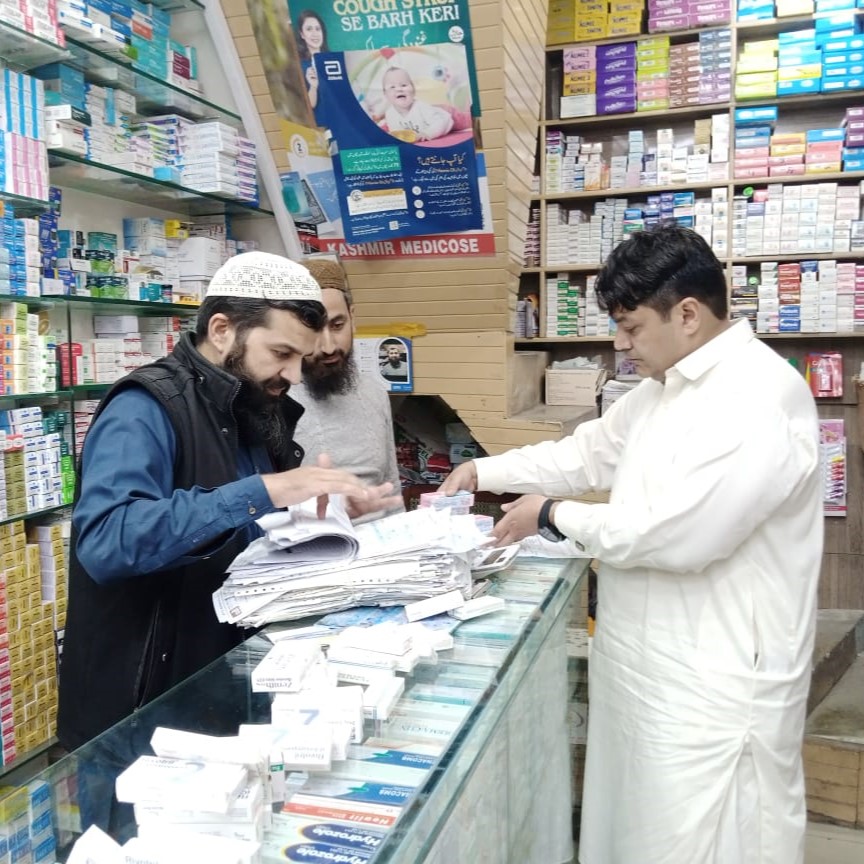When the health condition of patients in private hospitals in Muzaffarabad started deteriorating consistently after the use of a particular medicine, a decision was made to test the drug. Upon receiving the results, a wave of concern swept through everyone.
For some time, complaints had been emerging from the medical staff of a private hospital in the city that the health of patients worsened after administering a sedative drug for surgery.
A similar incident occurred at the Abbas Institute of Medical Sciences. There, as a pharmacist affiliated with the institute, Noreen Akbar revealed that the drug used to induce unconsciousness in patients before surgery, Isoflurane, is manufactured in the United States. In Pakistan, this drug was being supplied to various suppliers, including the Abbas Institute of Medical Sciences.
Doctors have drawn attention to the fact that among those receiving Isoflurane, complaints of jaundice and hepatitis C are emerging, in addition to other issues. Laboratory tests have confirmed that instead of isoflurane, chloroform, which is a banned substance, was present in the medicine.
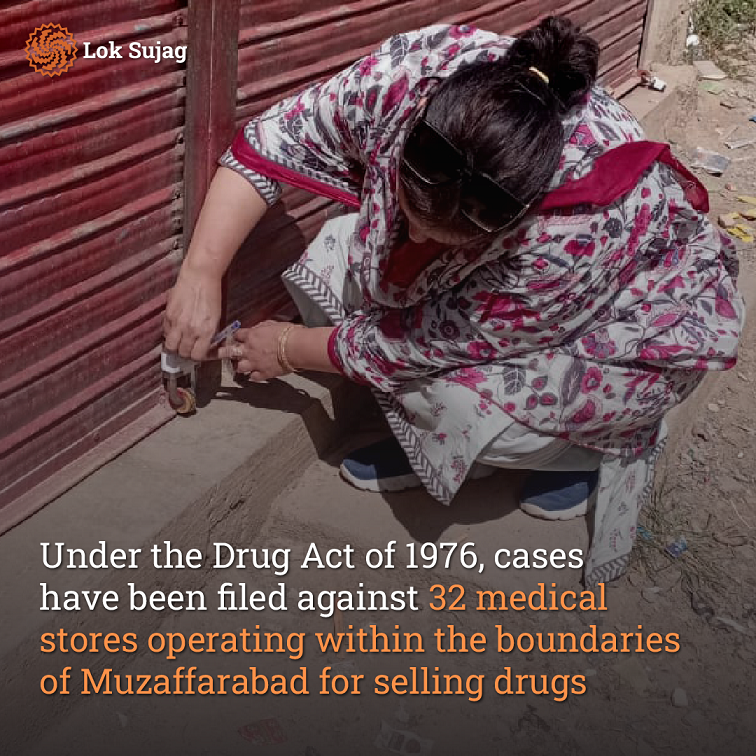
When cases of counterfeit drugs came to the notice of the drug inspector, he initiated a crackdown against those selling fake medicines.
Drug Inspector Fozia Ashraf says that during this period, 32 medical stores operating based on counterfeit diplomas were shut down in the vicinity of Multan. Cases were registered against them under Section 23 of the Drug Act of 1976. According to her, these medical stores have not reopened to date.
In eight out of the ten districts of Azad Kashmir, drug inspectors conduct medical store inspections, while in the remaining two districts, District Health Officers personally oversee the checking of medical stores. According to data obtained from the office of the Director General of Health, a check of 9,056 medical stores was carried out from June 2020 to June 2023. Of these, 2,947 are registered, while the remaining 6,109 medical stores are not registered. The number of medical stores in Muzaffarabad alone is more than 1,500, with three-fourths operating without registration.
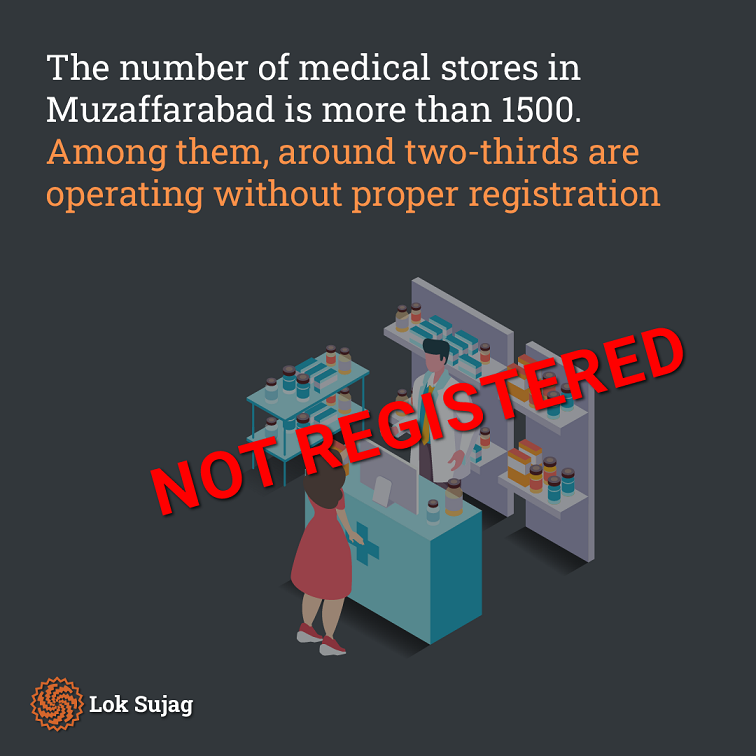
On the condition of anonymity, an officer from the Health Department revealed that there were four hundred such stores that were issued licenses by the Health Department based on counterfeit diplomas. These establishments have been operating for the past twenty years, with the majority involved in selling counterfeit or substandard medicines.
In these stores, along with the sale of counterfeit, substandard, expired, and unregistered medicines, there were also medications being sold that were ostensibly labelled as one thing but contained something else internally. These were hazardous and unsuitable for human use. They were being sold under names such as Examol Extra, Injection R.L 1000 ml, and Calcium Carbonate 800.
A total of 1,970 samples of medicines were sent to Mirpur DTL (Drug Testing Laboratory) by the department. Of these, 27 medicines were found to be substandard, 45 had exceeded their expiration dates, and 56 were unregistered.
During the operation, 70 medical stores were shut down for operating without a drug sale license and qualified staff.
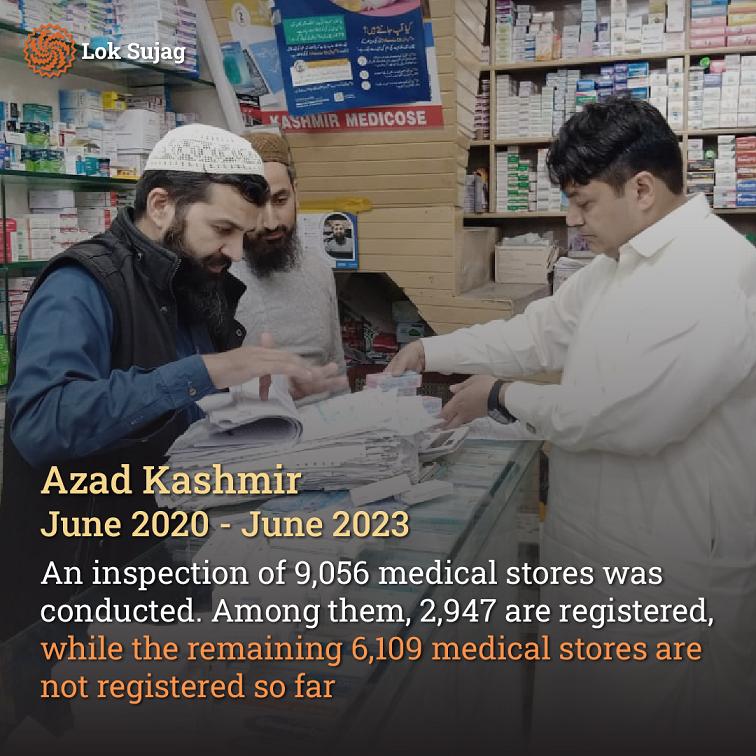
In addition, the Quality Control Board, Azad Kashmir, has received 78 cases in which medical stores reported complete violations of drug sale rules. The Quality Control Board has approved for the trial of these cases; however, action is possible only when drug courts are available.
Chief Drug Controller Sardar Riaz Al-Hassan says that the state cannot permit the business of counterfeit medicines. In Azad Jammu and Kashmir, under Section A of the Drug Act of 1976, those involved in manufacturing and selling counterfeit drugs can face a minimum of five years imprisonment and a fine of five hundred thousand rupees. However, due to the inactivity of the drug court, those engaged in the illicit trade of medicines are getting away with impunity.
"Due to the inactivity of drug courts since 2021, the registration of 329 cases could not be processed, and several cases under trial have also faced delays. This is why, during the last three years, only one person involved in the business of counterfeit medicines is facing a case in the Islamabad High Court."
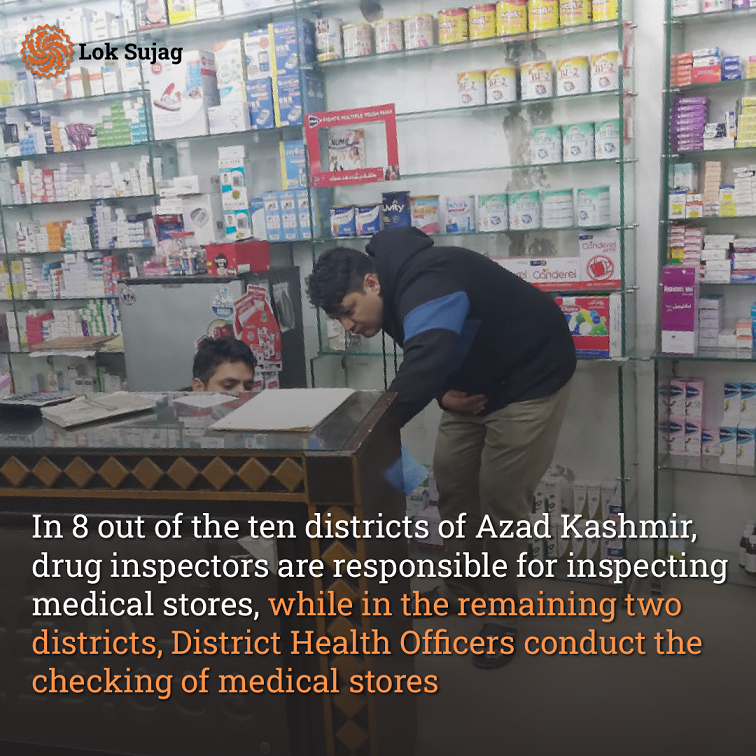
Riaz Al-Hassan says that the Drug Court in Azad Kashmir was established under Section 31 of the Drug Act of 1976. This act was adopted in Azad Kashmir in 1986. Initially, the Drug Court was operated by assigning additional charges to a High Court judge. Later, the charge was given to a Banking and Accountability Court judge.
"In November 2021, the judge of the Accountability Court retired, and since then, this court has been inactive. A separate Drug Court has not been established yet, with the primary reason cited being a shortage of resources."
Director General Health, Sardar Aftab, informed Lok Sujag that action can be taken and penalties can be imposed only through the Drug Court in Azad Kashmir. However, the establishment of the court is the government's responsibility.
"The counterfeit diplomas are twenty-two years old, and I don't want to give an opinion on who issued them and who kept renewing them. However, since I have taken charge, various actions have been taken against them."
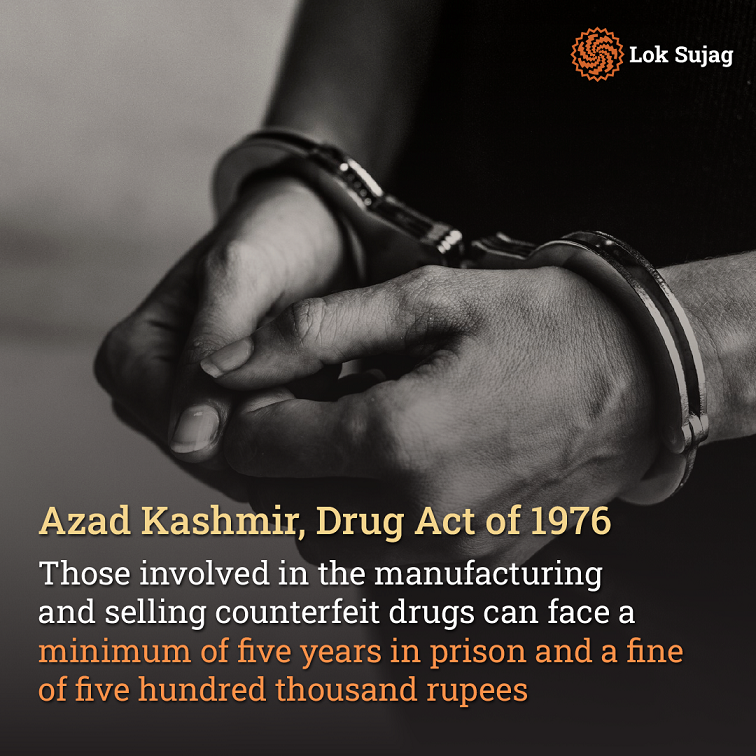
Sardar Aftab says that anyone playing with human life does not deserve forgiveness. A committee has been formed to investigate this matter, and its members do not want to disclose any information because these individuals attempt to access them through various means. Until legal requirements are fulfilled, opening any store does not arise.
On the other hand, when Drug Inspector Fozia Ashraf and DHO Aamir Shahzad took action against those involved in the business of counterfeit medicines, they faced resistance from the courts and high-ranking government officials.
DHO Aamir Shahzad says that when he sealed a medical store here, he and his subordinate staff were threatened with termination from their jobs and physical harm. In response, he has filed a First Information Report (FIR) at the local police station.
"First, a hefty amount was offered as a bribe to reopen the store. Upon refusal, threats of physical harm were made.
Other staff members also receive such threatening messages daily, of which the screenshots are available.”
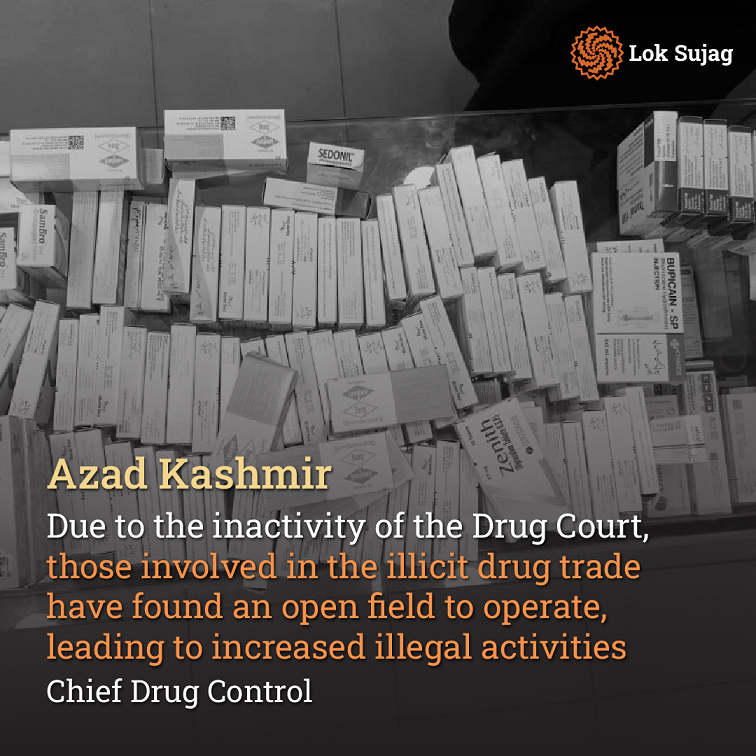
Several medical stores could not remain closed for an extended period. An official from the Health Department, on the condition of anonymity, revealed that medical stores that had obtained protection from political groups were allowed to reopen at the end of September.
Regarding the question of taking action against pharmaceutical companies involved in this matter, he says that if any medical store shows warranty receipt, then we also take action against the company that has supplied counterfeit or substandard medicines.
Also Read
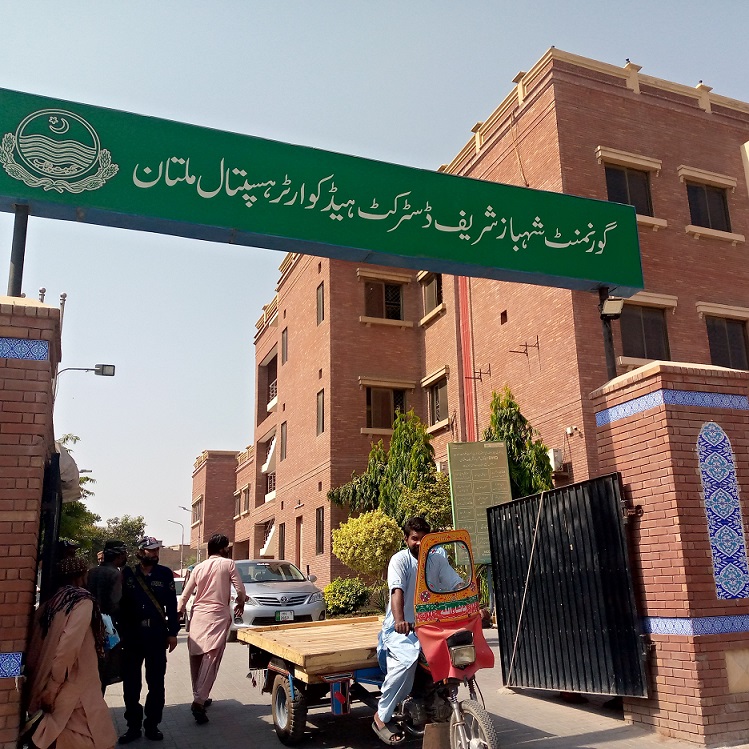
Medicine shortage hits hepatitis patients in Multan: A growing health crisis
“In 2020, I wrote to that time Deputy Commissioner Badar Munir suggesting that these companies should be brought into a tax net so that they can pay taxes. Unfortunately, no practical steps have been taken yet. Regrettably, none of the pharmaceutical companies in Azad Kashmir are paying any kind of taxes, despite earning billions of rupees here through the sale of medicines.”
Representatives of the Pharma Association, including Sajid Salehriya, do not believe in the accuracy of the health department's statistics and claim that if that were the case, they would publish their own report. He accused health department officers of promoting such transactions, seeking bribes, and misleading the public.
"No medicine is substandard. If any medicine is substandard, why haven't the District Health Officer and responsible health department officials made the report public? Or why hasn't it been brought to our knowledge? This is nothing but propaganda."
He says that in Azad Kashmir, on the condition of anonymity, three to five hundred pharmaceutical companies are operating, all of which are registered with Pakistan. If any medicine is substandard, action should be taken against that medicine and the company involved.
Published on 4 Dec 2023
